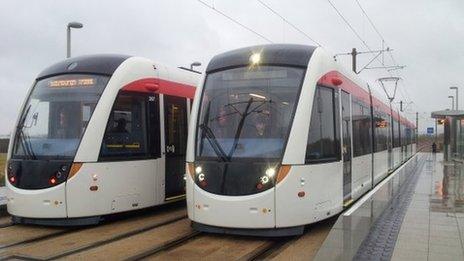Edinburgh trams: Tax break hopes for project
- Published

Trams are due to return to Edinburgh next year
Edinburgh City Council is hoping for a tax break to turn a profit from its tram project.
The new network is projected to make £5m profit over 15 years, but this relies on £11m of loosely specified "other funding" beyond ticket receipts.
One source of this could be to make most tram income tax deductible.
Councillors will debate the plans later. The cities transport convener Lesley Hinds admitted the figures were provisional, but said they did add up.
The meeting papers state: "In order for the (£5m profit) to be achieved, it is critical that Edinburgh Council has in place and exercises the appropriate shareholder controls, takes proactive measures to realise income and tax savings from the opportunities set out and actively monitors the financial position over the term.
"Tax saving of £11m may be possible within the group if the sinking fund payments (tram profits) are allowable as deductions from income for corporation tax purposes."
Operating surplus
Other sources of additional funding include advertising on trams, increased footfall through a partnership with Edinburgh Airport, and a general rise in footfall through "optimal integration" between trams, buses, trains and planes.
Fare "optimisation", such as charging a premium for airport trips similar to the current Lothian 100 express bus, may also be used but the council has made a commitment to keep tram fares the same as bus fares.
Mrs Hinds said: "These figures are provisional but they stack up and, all things considered, Edinburgh's new transport company is predicted to deliver a surplus.
"Even on its own, the tram is predicted to deliver an operating surplus.
"The tram and bus service will be fully integrated, with tickets, timetabling and everything else being delivered through one system.
"This is the same for the finances. Under one company both services need to operate together.
"Whilst this business model and all predictions have been and continue to be verified externally, it's important to remember that they are still predictions."
'Sinking fund'
The £5m profit relies on a complex chain of ticket receipts, operating costs, tax and shareholder dividends from three companies all feeding into Edinburgh City Council.
The council expects to make £228m from tram tickets (Tramco) and £2.59bn from buses (Busco). Tramco is expected to cost £177m to run and Busco £2.28bn.
Busco is expected to pay capital expenditure of £222m, on new buses, but Tramco will have no capital expenditure.
All of Tramco's infrastructure spending, £87m in repairs and refurbishments, will instead be paid directly by the council at the end of the chain.
This will allow the council to absorb most of Tramco's income as a "sinking fund" for reinvestment into the network, which they hope will make it tax deductible.
Busco's income, minus a £3m dividend to shareholders, will feed into a new holding company (Topco), which will pay taxes of about £37m.
- Published21 June 2013
- Published10 June 2013
- Published24 May 2013
- Published26 April 2013
- Published8 March 2013
- Published7 February 2013
- Published19 December 2012
- Published26 November 2012
- Published23 October 2012